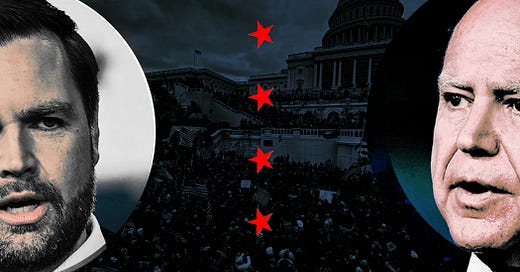The One Question That Mattered in the VP Debate
JD Vance failed to reject Trump’s lies about the 2020 election. He can’t be trusted to protect democracy.
IN TUESDAY NIGHT’S VICE-PRESIDENTIAL DEBATE, JD Vance and Tim Walz covered lots of issues: inflation, housing, guns, abortion, immigration, health care, and much more.
But there was only one question on which the vice presidency—the job for which these two men are competing—really matters. That question was whether they would certify the results of the next presidential election. And on that subject, Vance gave a non-answer that instantly disqualifies him: He refused to acknowledge that Donald Trump lost the 2020 election.
Certification of elections was a central factor in Vance’s audition to become Trump’s running mate. Other contenders for the job demonstrated, as Vance did, that they were sufficiently right-wing or loyal to MAGA. But, as Thomas Joscelyn has pointed out in The Bulwark, Vance stood out in one respect: He was the one who signaled most clearly that he was willing to push constitutional boundaries to do Trump’s bidding.
In February, Vance went on ABC’s This Week and made it clear that unlike Mike Pence, he would have collaborated in Trump’s scheme to block the certification of electoral votes on January 6, 2021.
Q: Would you have certified the election results had you been vice president?
Vance: If I had been vice president, I would have told the states, like Pennsylvania, Georgia, and so many others, that we needed to have multiple slates of electors. And I think the U.S. Congress should have fought over it from there.
Three months later, in an interview with Ross Douthat of the New York Times, Vance defended Trump’s scheme and explained how a vice president could have executed it. “You would try to marshal alternative slates of electors, like they did in the election of 1876,” said Vance. “The entire post-2020 thing would have gone a lot better if there had actually been an effort to provide alternative slates of electors and to force us to have that debate. I think it would’ve been a much better thing for the country.”
Vance dismissed the argument that courts had already rejected Trump’s allegations of election fraud. “You can’t litigate these things judicially; you have to litigate them politically,” Vance told Douthat. “And we never had a real political debate about the 2020 election.”
When Douthat suggested that pursuing Trump’s scheme “would have pushed America into a crisis,” Vance refused to concede that the scheme was illegal. Trump “was using the constitutional procedures,” Vance argued. “He was trying to take a constitutional process to its natural conclusion.”
In short, Vance made it clear that he believed 1) Congress could second-guess and override election results submitted by states; 2) politicians, not judges, should decide these matters; and 3) any scheme could be rendered presumptively constitutional by inventing a new interpretation of the Constitution. As a Yale Law grad, he surely knows better.
In theory, the Electoral Count Reform Act, which Congress passed in 2022, would thwart a replay of Trump’s 2021 plot. The law specifies that the vice president has “no power to solely determine, accept, reject, or otherwise adjudicate or resolve disputes over the proper list of electors, the validity of electors, or the votes of electors.” If Vance were to overstep this boundary as vice president, courts would presumably intervene.
But this is another area where Vance has distinguished himself: Unlike other politicians who vied to become Trump’s running mate, Vance has signaled that he’s willing to defy the courts.
In September 2021, appearing on a right-wing podcast, Vance said he had “one piece of advice” for Trump in a second term:
Fire every single midlevel bureaucrat, every civil servant in the administrative state. Replace them with our people. . . . And when the courts stop you, stand before the country like Andrew Jackson did, and say, “The chief justice has made his ruling. Now let him enforce it.”
In February, Vance reaffirmed that position. On This Week, he declared that some Supreme Court rulings constraining presidential power could be rejected as “illegitimate.”
THIS IS WHY THE FINAL EXCHANGE of Tuesday’s debate is so important. Vance was given an opportunity to dispel concerns that he would use the vice presidency to overturn another election. He declined that opportunity. In fact, he refused to admit that Trump lost the 2020 election.
To this day, Trump insists that the 2020 election was “rigged and stolen” from him. Trump also claims that the “only way” he can lose this year’s election is if Democrats “cheat like hell” as they (according to him) always do. He’s preparing his supporters to rebel again if he loses. And if he wins, he’s laying the groundwork—this time, with a more amenable vice president—to overturn a loss for his party in 2028.
In the final minutes of Tuesday’s debate, Walz asked Vance a simple question about Trump: “Did he lose the 2020 election?”
Vance refused to answer. “I’m focused on the future,” he replied. He changed the subject: “Did Kamala Harris censor Americans from speaking their mind in the wake of the 2020 COVID situation?”
“That is a damning non-answer,” said Walz.
It certainly is. In a second Trump administration, Vance’s opinions about tariffs, abortion, health care, and other issues probably wouldn’t matter. Trump would make those calls. But when the time comes to certify an election, Vance’s opinions and decisions would be crucial. He believes that he and Trump could push constitutional boundaries to overturn the results. And on the debate stage, facing two audiences—the people of the United States on one hand, and Trump on the other—Vance refused to acknowledge that Trump lost.
That moment tells you the most important thing about Vance: When democracy is in peril, he will bow to Trump, not to the people or the Constitution. He must never be given that chance.





